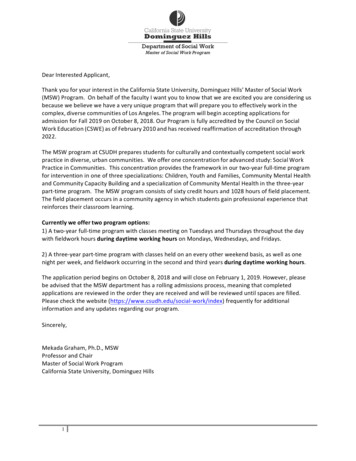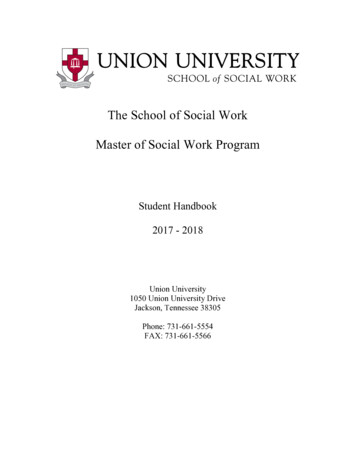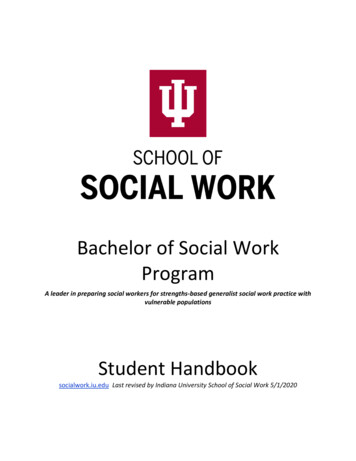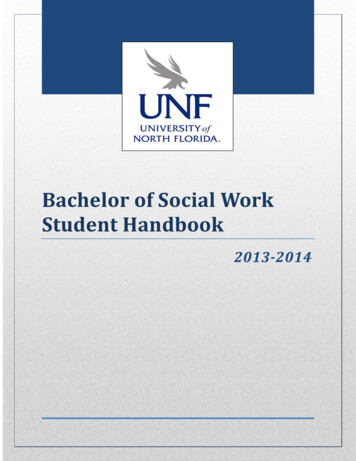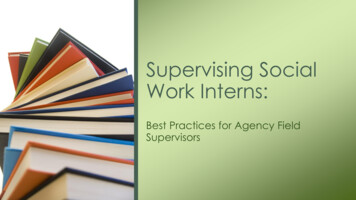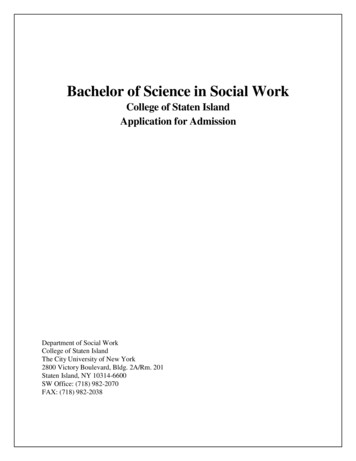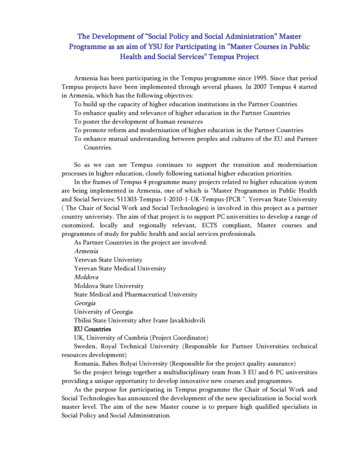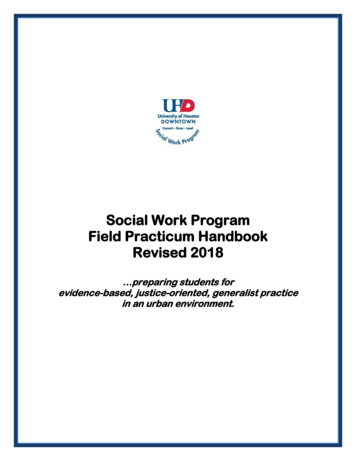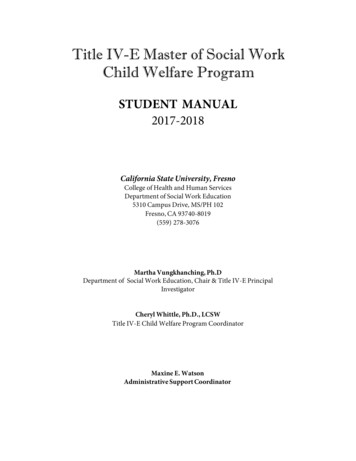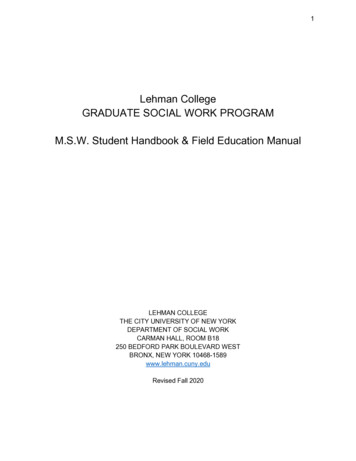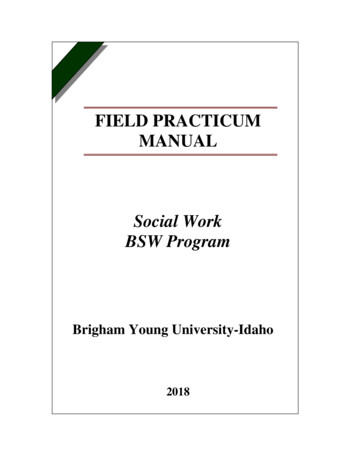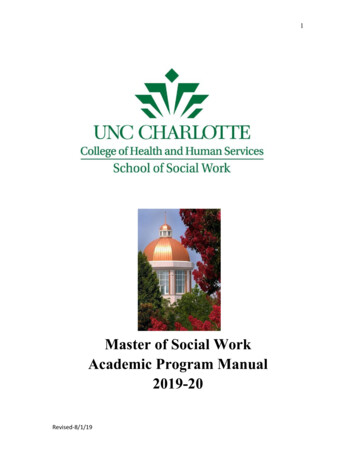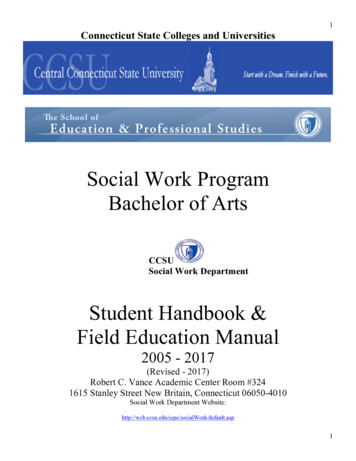
Transcription
1Connecticut State Colleges and UniversitiesSocial Work ProgramBachelor of ArtsCCSUSocial Work DepartmentStudent Handbook &Field Education Manual2005 - 2017(Revised - 2017)Robert C. Vance Academic Center Room #3241615 Stanley Street New Britain, Connecticut 06050-4010Social Work Department t.asp1
2CCSUSocial Work DepartmentSocial Work DepartmentStudent Handbook &Field Education Manual2005 - 2017(Revised - 2017)Joanne León, PhD, MSW, LCSW Assistant Professor &Chair, Department of Social Workleonj@ccsu.edu 860.832.3146Catherine (Cathy) R. Baratta, PhD, MSW, MIPA, Associate Professorbarattac@ccsu.edu 860.832.3016Glenn Gemma, MSW, LCSW Assistant Professorgemma.g@ccsu.edu 860 832.2739Yvonne O. Patterson, PhD, MSW, Assistant Professorpatterson.y@ccsu.edu 860.832.3070Reinaldo Rojas, PhD, MSW Assistant Professorreinaldo.rojas@ccsu.edu 860.832.3129Catherine Gentile Doyle, MSW, LCSW Adjunct Faculty &Field Education Coordinatorcgentiledoyle@ccsu.edu 860.832.2739Vincenza TestaSocial Work Department Secretarytestav@ccsu.edu860.832.3129 Fax: fault.asp2
3CCSUSocial Work ion to Department of Social WorkSection I. Connecticut State University System678101. Connecticut State Universities Mission Statement2. Central Connecticut State University (CCSU) Mission & Policies3. School of Education and Professional Studies (SEPS) Mission & policies4. Social Work Program Mission, Accreditation & Professional Statements Council on Social Work Education Policy and Accreditation Standards (2015) National Association of Social Workers Code of Ethics (2007) National Association of Social Workers Standards for Cultural Competence (2007)5. What is Social Work?6. Social Work Program Assessment Conceptual ModelSection II. Social Work Program Policies and Procedures441. Faculty Full Time Adjunct Faculty Advisory Board2. History of Social Work ProgramSection III. Social Work Program Curriculum511. Generalist Social Work Definition – CSWE (2015) Educational Policy 2.02. The 4-Year Academic Map Pre-requisite Courses Pre-Major Courses Core Social Work Major Courses Senior Social Work Courses Social Work Electives3. Course Descriptions Pre-requisites Core Social Work Courses3
4Section IV. The Pre-Major Social Work Student631. The Pre-Major Social Work Student2. Setting up CCSU email3. Advising Requirements Incoming CCSU freshman Procedure Transfer Student Procedure Pre-Major Student Advising for Students Already in the Pipeline4. Change of Major to Social Work Procedure5. Pre-requisite courses6. Pre-Social Work Core Courses7. The Social Work Program Curriculum Sheet- Effective Fall 20128. 70-hour Volunteer Generalist Practice Field Work RequirementsSelecting Field Agency Student Responsibilities & Student Safety Policy Vehicle Policy 70-Hour Volunteer Field Evaluation9. Applying to the Social Work Major10. Social Work Selective Admission to the Major Policy and Procedures11. Portfolio Requirements Pre-Major Application to Social Work Major Electronic Portfolio Guidelines12. Statement of Understanding13. Incoming Students to Social Work Major/Orientation Meeting14. The Social Work Club15. Chi Upsilon Chapter Phi Alpha Honor SocietySection V. The Social Work Major Student821.Advising Requirements2. 70-Hour Volunteer Generalist Practice Field Work Requirements Selecting Field Agency Student Responsibilities & Student Safety Policy Vehicle Policy 70-Hour Volunteer Generalist Practice Self-Evaluation 70-Hour Volunteer Generalist Practice EvaluationSection VI. The Senior Student Intern in Field Education Experience89CSWE (2015) Educational Policy 2.21. Application to Senior Field Education Eligibility Requirements for Application to Senior Field Step 1 Senior Field Orientation4
5 Step 2 Portfolio Requirementso Explicit Curriculum Course Requirements First Senior Semestero Explicit Curriculum Course Requirements Second Senior Semester Senior Field Education Seminar and Field Work Assessments First Semestero 70-Hour Field Work Instructor Assessmentso Portfolio Requirements Procedure for Senior Student Ineligible for Admission to Senior Field Education basedon C- or lower Social Work Course grades or below GPA of 2.5 in the Major2. Preparing for the Advising Interview with Field Education Coordinator Assignment of Field Work Practicum Setting Preparing for the Field Agency Field Instructor Interview Review of Statement of Understanding & FERPA Release Confirming Placement Student Responsibilities & Student Safety Policy Vehicle Policy Policy for senior Intern Hired at Senior Field Agency During Senior Field Education3. Faculty Senior Seminar Course Instructor/Faculty Liaison The faculty Liaison Responsibilities4. Role of Field Agency Instructor The Field Agency Instructor Responsibilities to Senior Studento Applying to become a Senior Field Education Agency Instructoro Applying to become a Senior Field Education Approved Agency5. Graduating Senior Terminating with Field Education Agency6. Graduating Cohort Focus Group/Exit Interview7. Seniors Celebrating & Terminating ProgramSection VII. The Graduating Student Awards103 Department Award Henry Barnard Scholars Sosnowitz AwardSection VIII. Appendices, Glossary & References1055
6PrefaceThis student handbook and field education manual is for students interested in enrolling in generalistsocial work undergraduate Bachelor of Arts program at Central Connecticut State University. However, webelieve that students who are undecided in their course of study will also find our handbook useful in helpingthem make a decision for a course of study. The handbook and field manual has grown out of years ofexperience developing and teaching basic courses in social work generalist practice. There is a common coreset of concepts, competency skills, values, tasks and activities that are essential to the generalist practice ofsocial work from which the practitioner can build.Sections I-III of this handbook provide detailed information on the context of the social work programwithin the university policies, the mission of the program, the faculty, advisory board members the requiredcurriculum and professional development requirements for students. Section IV provides detailed informationon the role of the student as a beginning learner in the profession of social work and how to make transitioninto the major. Section V discusses the responsibilities of the student in the major. Sections VI-XIX presentthe Field Education Manual: The Signature Pedagogy of the social work generalist practitioner. Our programmodel is intended to provide a base for the generalist social work practitioner, as opposed to the specialist. Itsets the foundation for both academic and initial field practicum experience that serve as the underlyingprinciples of knowledge and practice experience for social workers. It seeks to provide a framework thatmakes apparent the essential unity and cohesiveness of the academy and the social work profession integratingthe required Educational Policy and Accreditation Standards (EPAS) mandated by the Council on Social WorkEducation (2015) and the professional standards established by the National Association of Social workers(2007) to provide the basis for professional skill and identity development for those who practice social work.It ties together the knowledge, skills, values and underlying methods of the general principles with a strengthfocus on the relationship of people to the planned change effort. The leadership of the generalist social workerin the change effort is determined by the nature of the task at hand.Transitioning from a beginning pre-major social work student to the generalist social workprofessional will be a journey that promises to be challenging work. However, the journey will also havemany moments of fun, and enjoyment building rewarding collaborative learning relationships with students,faculty and staff in the social work department. We hope you, as a beginning student will find the handbookand field education manual useful throughout your journey in the CCSU social work program.6
7AcknowledgementsWe are indebted to many people who have helped in the development and growth of the social workprogram through the years. Our academic colleagues teaching in the classroom and faculty colleagues teachingin the field setting working with students as field instructors have offered many insights and ideas on ways toimprove the program. Many gave and continue to give generously of their time in helping the programdevelop a high-quality generalist model.Students in the program courses over the past years who have been exposed to ongoing changes in theprogram, on the campus, in society, and in the social work profession in general have offered the programstrong insights, ideas, energy and enthusiasm to make the program what it is today. They have helped facultyto re-think texts, assignments, activities and field placements and contexts of care. They have done this whiledemonstrating social work self-advocacy skills as well as by communicating their experiences in theclassroom and in the field education settings. Their willingness to engage in critical inquiry discussions withfaculty and offer recommendations and ideas illustrate the collaborative climate conducive in the program ateach step of the journey.While there are distinct levels of authority and accountability we are indeed partners with students inseeking to identify and support exceptional learning opportunities and demonstrated learning outcomes. Manyformer students continue as alumni serving on the social work alumni committee, advisory board, and/orparticipating in campus activities in support of the social work program. Others stay in communication toinform faculty of changes in the practice environment in their areas of interest. We are very grateful forstudents and the strong commitment with the program.Finally, we are grateful to the administration for years of guidance, and support on the CCSUcampus. Administrators throughout the years, are also partners in learning have offered both strong criticism,and enthusiasm yet strove to keep us close to reality in order to grow the program efficiently and effectively.One example is the enthusiastic support for the development of the ‘weekend program’ now the “EveningWeekend Program,” to enable adult learners, working full-time with family obligations to fulfill their dreamsto access higher education learning opportunities and become a professional social worker.7
8Introduction toDepartment of Social WorkAll of us involved in the Bachelor of Arts program are excited about your decision to obtain your generalistsocial work education at Central Connecticut State University. We are committed to developing your social workeducation into a compelling, meaningful and professional training experience that will provide you with the foundationknowledge necessary for you to move forward into your next social work professional development learningopportunity. We expect that your academic education will provide you with a transformative experience that willprepare you to increase your social work skills and competencies to either enter beginning generalist practice in socialwork positions and or to prepare you for admission into graduate schools of social work.As you read through this student handbook and field education manual many concepts may be unfamiliar to you.To assist in defining the concepts for you a glossary is added at the end after the appendix. Becoming a social workprofessional requires learning the professional language. Learning the concepts and understanding how the concepts fitinto your professional education are the initial stepping-stones on your journey forward. Students will learn tocommunicate both in written and oral form according to the guidelines of the social work profession in the classroomand in practice settings.Given the notable investment that you are making in your social work academic and field education and theimportance that it holds to you, to us in the social work department, and to the individuals, families, groups, andorganizations that we serve, we are steadfast to partner with you. The faculty and I will work with you to achieve thesocial justice goals we are all committed to in the new millennium.We expect that you as a partner in learning will remain resolute to work hard, to enjoy the learning experienceand to be challenged at each step of your undergraduate work. The CCSU social work program emphasizes beginningskill competency development in 10-core specific competencies required by the Council on Social Work Education.Additionally, the National Association of Social Workers (NASW) Code of Ethics and the Indicators for the Achievementof the NASW Standards for Cultural Competence in Social Work Practice (2007) provide the required standard whichour program adheres to in order to ensure students are receiving training in diversity within the professional mandate.The department of social work offers a traditional undergraduate program as well as an evening/weekend option,with classes offered on Saturday; both the traditional program and the evening/weekend option are modeled on Councilon Social Work Education competency-based education. Program graduates are prepared for beginning generalist socialwork practice and for acceptance into graduate school. The social work program is accredited at the undergraduate levelby the Council on Social Work Education (CSWE) and is a member of in CCSU Chi Upsilon Chapter of Phi AlphaSocial Work National Honor Society.The social work program engages traditional and non-traditional adult learners at each step by soliciting studentfeedback on both the implicit (learning environment) and explicit (syllabus and course content) curriculum.Additionally, the program combines assessment of students in four 70-hour volunteer field learning experiencesbeginning in the pre-major level to the final 2-semesters each with 200–hour, senior field internship. By graduation moststudents have acquired close to 700 hours of field experience. Students in the program are encouraged to develop8
9collegial relationships by becoming members of the social work club and strive to reach scholarship eligibility in CCSUChi Upsilon Chapter of Phi Alpha Social Work National Honor Society. Inductions to Phi Alpha are held each springsemester. Students are also encouraged to become student members of NASW attend NASW, and other professionalconferences on and off campus to enhance learning.Faculty take the lead role in modeling social work skills and competencies using a variety of teaching strategiesand techniques to engage students in learning including group work, and educational presentations. Guest speakers areinvited in order to build cultural and community awareness and understanding among students and professionalsworking in the social work field. Faculty seek to foster a safe, respectful environment that enable students todemonstrate critical thinking, engage in faculty/student critical inquiry discussions, to express social justice issues ofconcern. Faculty also assist the student to identify the needed campus support resources, and encourage students toengage in using the resources, while supporting the student in the learning environment to develop professional selfawareness, self-reflection and accountability. Faculty brings a wealth of knowledge to the classroom from their ownextensive social work practice experience, scholarship, research and publications. The faculty team has a strongcommitment to academic excellence. The commitment includes excellence for faculty, students, the individuals andfamilies served, the campus community and the community at large.Again, the purpose of this handbook is to provide prospective and current students with basic informationconcerning the Bachelor of Arts degree in social work program offered by the department of social work at CentralConnecticut State University (CCSU). Guided by the missions of the Connecticut State Colleges and UniversitiesSystem (ConnSCU), Central Connecticut State University, and the mission of the CCSU School of Education andProfessional Studies (SEPS) the CCSU social work program is well grounded in an education in liberal arts providingstudents with the educational foundation of a generalist social work practice approach that fully integrates the corecompetency requirements of the social work profession at the micro, mezzo and macro level.The generalist perspective includes teaching students core values of professional collaboration, strengthsperspective, values and ethics, social justice, client self-determination, human rights, the dignity and worth of persons,evidenced-based practice, cultural competence, and policy practice. The structure of the CCSU social work programprovides students with an explicit and implicit curriculum in multiple levels of field practicum learning opportunities.The program is designed to assess student demonstrated learning outcomes based on the Council on Social WorkEducation Educational Policy and Accreditation Standards (EPAS) 9-core practice competencies. Students are assessedon the student demonstrated learning outcomes at the pre-major, major and senior level. Student learning outcomeassessments are completed at strategic points in the social work curriculum, preparing graduates for generalist practiceconsistent with the program mission and goals, or higher education opportunities at the graduate level.We hope that when you complete your education in our program you will do so with advanced social workknowledge, skills, values, and with a well-defined beginning social work professional identity. We look forward topartnering with you in your academic journey in the CCSU social work program.Best wishes on your social work academic journeySocial Work Department t.asp9
10Section I. Setting the Context for Understanding the Social Work Programwithin the Connecticut State University System1. Administrative Structure – CSWE (2015) EPAS 1.0Welcome to Connecticut State Colleges and Universities System (ConnSCU), Central ConnecticutState University (CCSU), School of Education and Professional Studies, (SEPS) Department of Social Work.The department of social work is located within the School of Education and Professional Studies at CentralConnecticut State University, which is part of the Connecticut 4-state university system, hence, the followingmission and policy statements for ConnSCU, CCSU, SEPS and the social work program. “ConnSCU providesaffordable, innovative and rigorous programs in settings that permit an ever-increasing number of students toachieve their personal and career goals as well as contribute to the economic growth of the state ofConnecticut.” http://www.ct.edu/ http://www.ct.edu/connscu#map Connecticut State Colleges and Universities2. Connecticut State Universities (ConnSCU) Mission StatementAs part of the Connecticut State Colleges & Universities (ConnSCU) system, the four ConnecticutState Universities offer exemplary and affordable undergraduate and graduate instruction leading to degrees inthe liberal arts, sciences, fine arts, applied field, and professional disciplines. They advance and extendknowledge, research, learning and culture while preparing students to enter the workforce and to contribute tothe civic life of Connecticut’s communities. Through a variety of living and learning environments, theUniversities ensure access and diversity to meet the needs of a broad range of students. They support anatmosphere of inter-campus learning, the exploration of technological and global influences and theapplication of knowledge to promote economic growth and socia
CCSU Social Work Department Social Work Department Student Handbook & Field Education Manual 2005 - 2017 (Revised - 2017) Joanne León, PhD, MSW, LCSW Assistant Professor & Chair, Department of Social Work leonj@ccsu.edu 860.832.3146 Catherine (Cathy) R. Baratta, PhD, MSW, MIPA, Associate Professor barattac@ccsu.edu 860.832.3016
